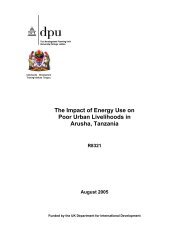EPA Review Annex Documents - DFID
EPA Review Annex Documents - DFID
EPA Review Annex Documents - DFID
You also want an ePaper? Increase the reach of your titles
YUMPU automatically turns print PDFs into web optimized ePapers that Google loves.
opportunity cost could be quite substantial particularly when it comes to <strong>EPA</strong> meetings in the<br />
region which are on some occasions conducted almost on a monthly basis.<br />
• Between 2005 and 2009, a total of $231,015.62 has been spent on Nigerian officials and<br />
experts attending negotiations within the region, covering payment for meetings, workshops,<br />
travel and allowances which are paid for by the ECOWAS Commission, the EC, UK<br />
Department for International Development (DfID) and Nigeria’s Ministry of Commerce and<br />
Industry.<br />
Counterfactual Cost<br />
• The costs involved in negotiating other trade agreements are ridiculously low when<br />
compared to the cost of the <strong>EPA</strong> negotiations because the latter is a reciprocal trade<br />
agreement between two unequal partners with the disadvantaged partner requiring<br />
understanding of the implications of that free trade on its own socio-economic and political<br />
structures.<br />
• While <strong>EPA</strong> is costlier in the aggregate because of the discussions in the several negotiation<br />
areas, it appears cheaper when individual processes that are similar are quantified.<br />
• It costs $2.4 million to maintain the Nigeria Trade Office in Geneva in 2009, an amount that is<br />
several multiples of the amount that has been spent on the <strong>EPA</strong> negotiations so far. This<br />
differential is a reflection of Nigeria’s better commitment to the WTO and its belief that the<br />
WTO will offer more trade gains than the <strong>EPA</strong>, due to its many aspects of special and<br />
differential treatment (SDT) and capacity building as part of the Doha Development Agenda<br />
support.<br />
Role of ECOWAS Commission<br />
• The role of the ECOWAS Commission during the negotiations has revolved around helping<br />
Nigeria participate in the negotiations especially outside Abuja. ECOWAS partly funds trips to<br />
Brussels, and sometimes Nigeria’s national consultants’ negotiations meeting attendance.<br />
• ECOWAS Commission also provides the necessary guidelines and methodology for the<br />
process towards reaching regional and <strong>EPA</strong> agreements e.g. adoption of the 5 th band of the<br />
CET and related issues, sensitive products, and West Africa market access offer, among<br />
others.<br />
• The ECOWAS Commission wanted Nigeria to show leadership in the process by<br />
interrogating how the <strong>EPA</strong> will impinge on its development interests and by accommodating<br />
small and vulnerable economies’ interests in the negotiations.<br />
Stakeholders Perspectives<br />
From stakeholders’ perspectives on <strong>EPA</strong> negotiations<br />
Negotiation Resources<br />
• Inadequate negotiating resources in Nigeria slowed down <strong>EPA</strong> consultation as impact<br />
assessment studies are not done or delayed, skills of negotiators are not upgraded, and only<br />
a few people attended negotiation meetings.<br />
• Arrival of external funds from DfID helped prepare studies of sensitive products list, Rules of<br />
Origin and common external tariffs (CET) as well as funding of meeting of the Technical<br />
Committee.<br />
• Because many meetings needed to reach a national consensus on each thematic issue<br />
internally, by bringing stakeholders together to agree and for Nigeria this involved pulling<br />
144
















